Case Study: Analyzing Social Media Issues for Sunshine 100, Australia
VerifiedAdded on 2022/12/28
|10
|1743
|31
Case Study
AI Summary
This case study examines the social media challenges encountered by Sunshine 100, a food company based in Sydney, Australia. The paper addresses four key questions: comparing social media and traditional communication challenges, the impact of employee social media behavior on an organization's image, the essential components of a company's social media policy, and the development of a communication strategy to disseminate the policy to staff. The study delves into the significance of social media, its impact on marketing, and the importance of employee conduct. It also provides a detailed communication plan template, outlining the target audience, desired messages, and communication channels to ensure effective policy implementation. This analysis offers valuable insights into managing social media presence and protecting a company's reputation.
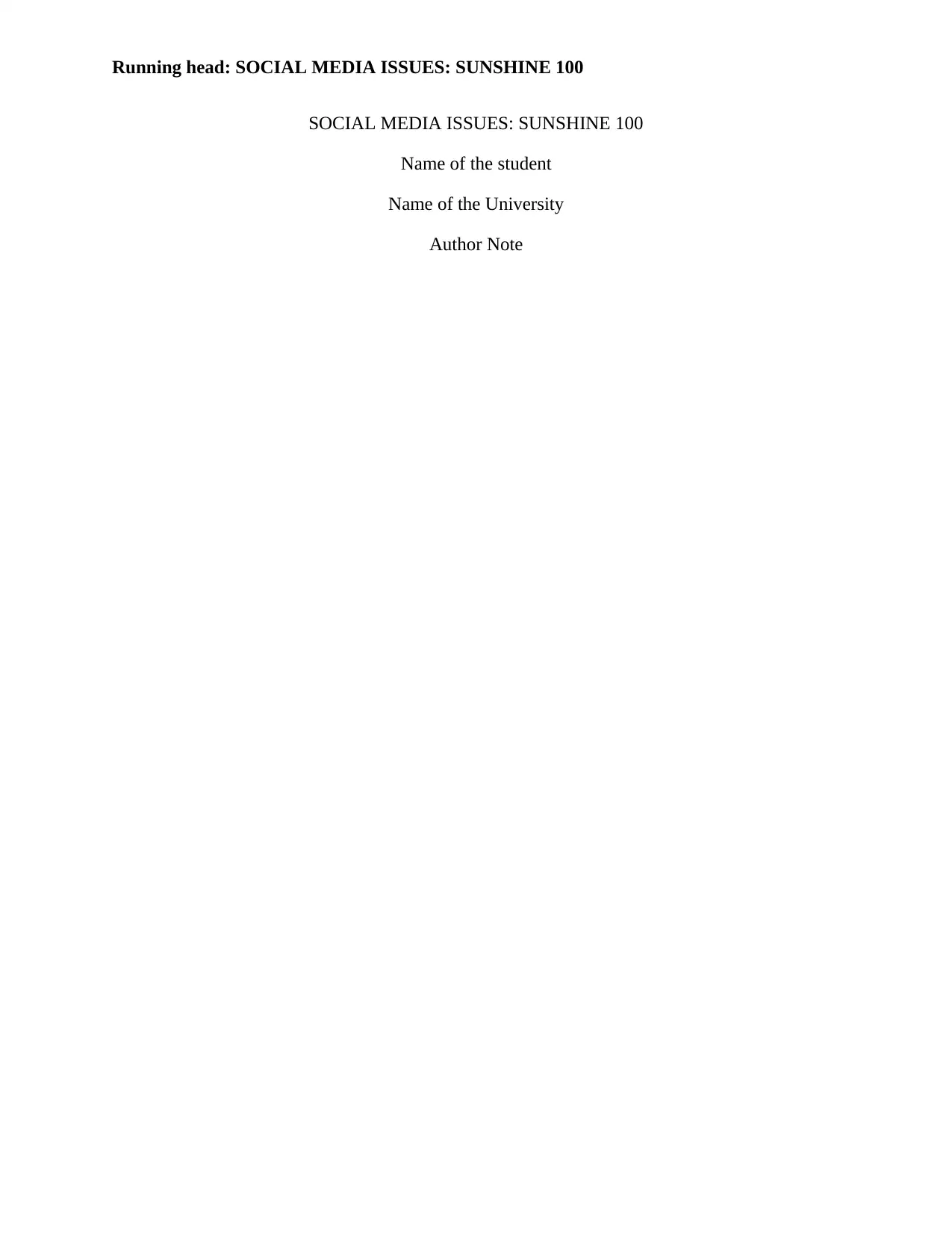
Running head: SOCIAL MEDIA ISSUES: SUNSHINE 100
SOCIAL MEDIA ISSUES: SUNSHINE 100
Name of the student
Name of the University
Author Note
SOCIAL MEDIA ISSUES: SUNSHINE 100
Name of the student
Name of the University
Author Note
Paraphrase This Document
Need a fresh take? Get an instant paraphrase of this document with our AI Paraphraser
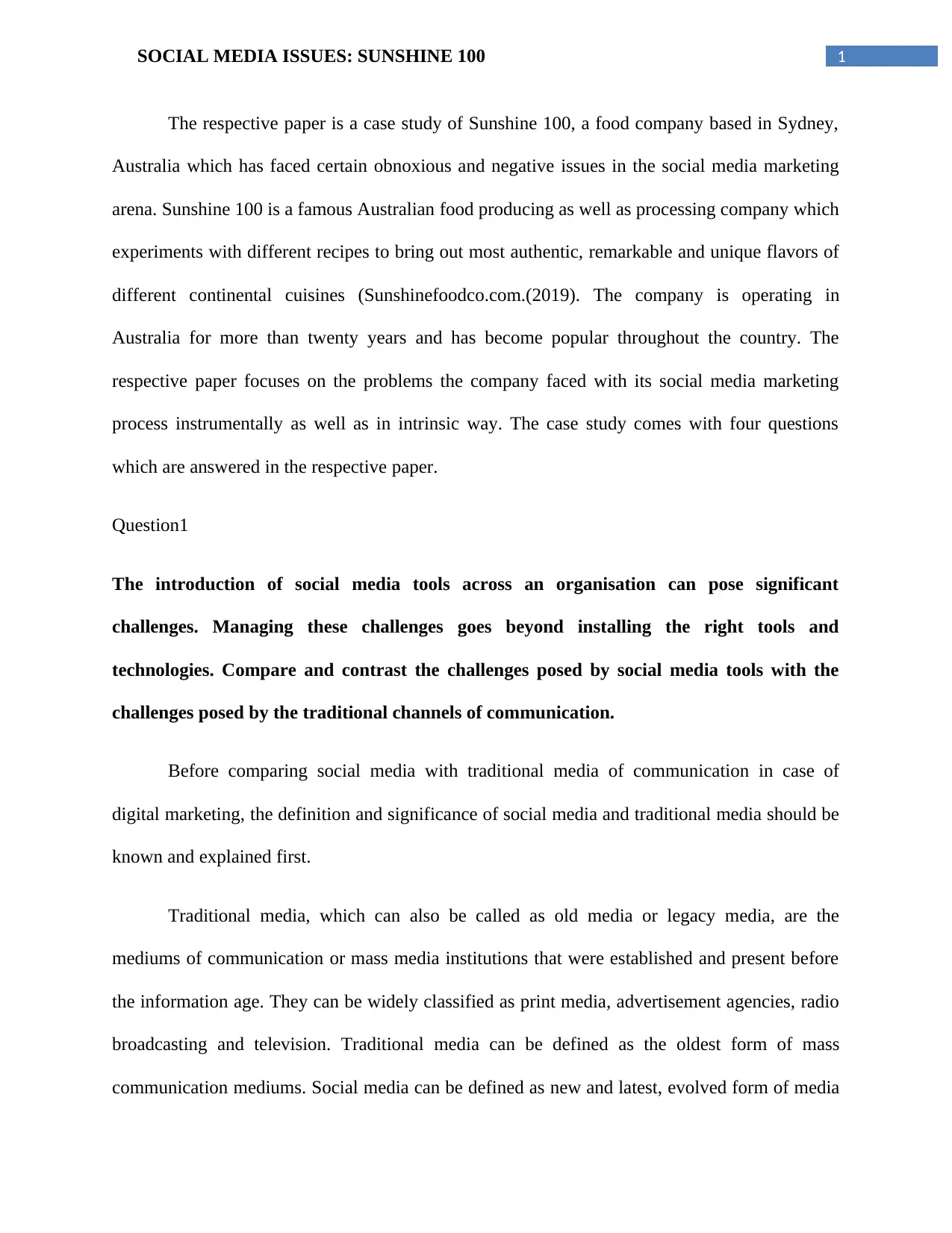
1SOCIAL MEDIA ISSUES: SUNSHINE 100
The respective paper is a case study of Sunshine 100, a food company based in Sydney,
Australia which has faced certain obnoxious and negative issues in the social media marketing
arena. Sunshine 100 is a famous Australian food producing as well as processing company which
experiments with different recipes to bring out most authentic, remarkable and unique flavors of
different continental cuisines (Sunshinefoodco.com.(2019). The company is operating in
Australia for more than twenty years and has become popular throughout the country. The
respective paper focuses on the problems the company faced with its social media marketing
process instrumentally as well as in intrinsic way. The case study comes with four questions
which are answered in the respective paper.
Question1
The introduction of social media tools across an organisation can pose significant
challenges. Managing these challenges goes beyond installing the right tools and
technologies. Compare and contrast the challenges posed by social media tools with the
challenges posed by the traditional channels of communication.
Before comparing social media with traditional media of communication in case of
digital marketing, the definition and significance of social media and traditional media should be
known and explained first.
Traditional media, which can also be called as old media or legacy media, are the
mediums of communication or mass media institutions that were established and present before
the information age. They can be widely classified as print media, advertisement agencies, radio
broadcasting and television. Traditional media can be defined as the oldest form of mass
communication mediums. Social media can be defined as new and latest, evolved form of media
The respective paper is a case study of Sunshine 100, a food company based in Sydney,
Australia which has faced certain obnoxious and negative issues in the social media marketing
arena. Sunshine 100 is a famous Australian food producing as well as processing company which
experiments with different recipes to bring out most authentic, remarkable and unique flavors of
different continental cuisines (Sunshinefoodco.com.(2019). The company is operating in
Australia for more than twenty years and has become popular throughout the country. The
respective paper focuses on the problems the company faced with its social media marketing
process instrumentally as well as in intrinsic way. The case study comes with four questions
which are answered in the respective paper.
Question1
The introduction of social media tools across an organisation can pose significant
challenges. Managing these challenges goes beyond installing the right tools and
technologies. Compare and contrast the challenges posed by social media tools with the
challenges posed by the traditional channels of communication.
Before comparing social media with traditional media of communication in case of
digital marketing, the definition and significance of social media and traditional media should be
known and explained first.
Traditional media, which can also be called as old media or legacy media, are the
mediums of communication or mass media institutions that were established and present before
the information age. They can be widely classified as print media, advertisement agencies, radio
broadcasting and television. Traditional media can be defined as the oldest form of mass
communication mediums. Social media can be defined as new and latest, evolved form of media
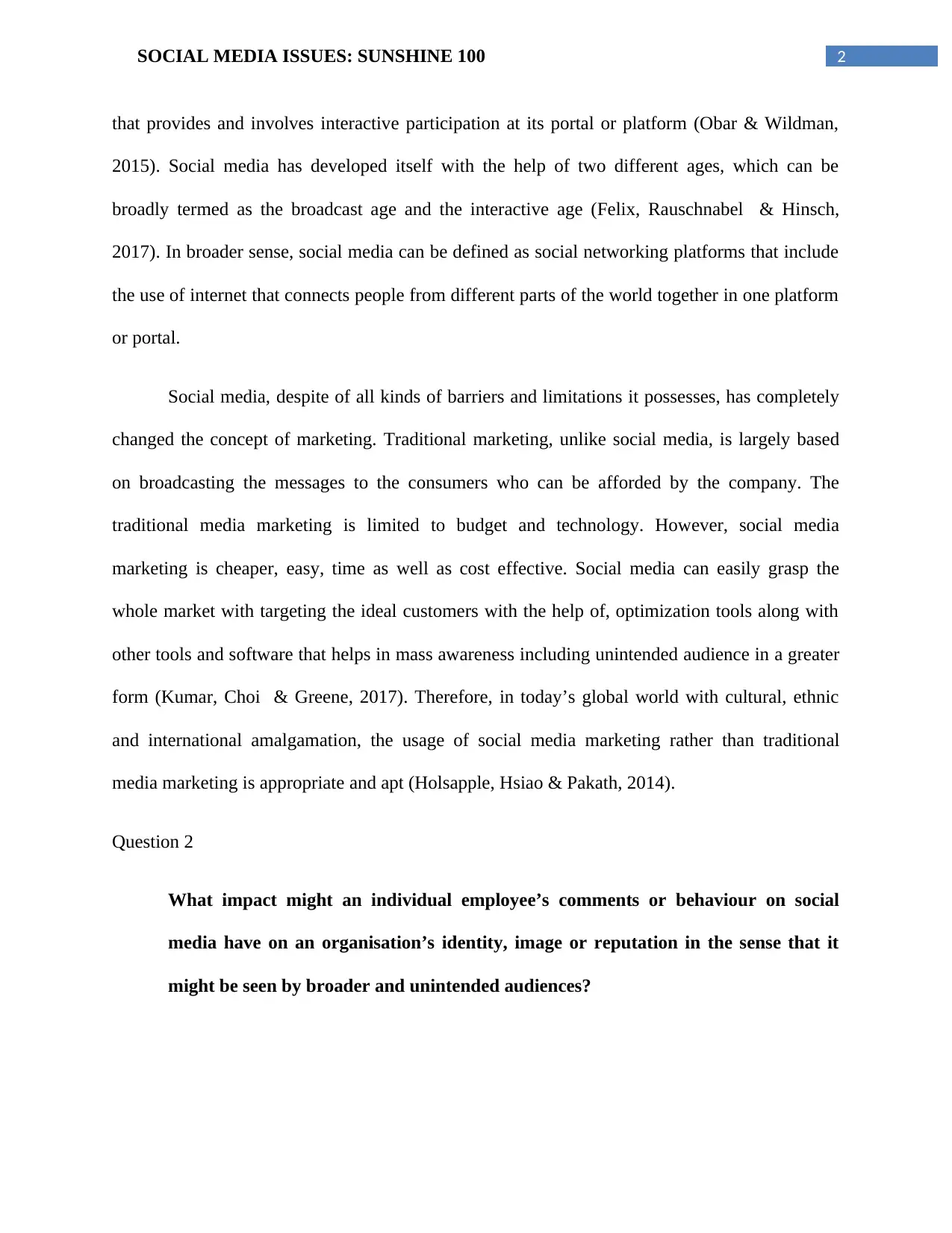
2SOCIAL MEDIA ISSUES: SUNSHINE 100
that provides and involves interactive participation at its portal or platform (Obar & Wildman,
2015). Social media has developed itself with the help of two different ages, which can be
broadly termed as the broadcast age and the interactive age (Felix, Rauschnabel & Hinsch,
2017). In broader sense, social media can be defined as social networking platforms that include
the use of internet that connects people from different parts of the world together in one platform
or portal.
Social media, despite of all kinds of barriers and limitations it possesses, has completely
changed the concept of marketing. Traditional marketing, unlike social media, is largely based
on broadcasting the messages to the consumers who can be afforded by the company. The
traditional media marketing is limited to budget and technology. However, social media
marketing is cheaper, easy, time as well as cost effective. Social media can easily grasp the
whole market with targeting the ideal customers with the help of, optimization tools along with
other tools and software that helps in mass awareness including unintended audience in a greater
form (Kumar, Choi & Greene, 2017). Therefore, in today’s global world with cultural, ethnic
and international amalgamation, the usage of social media marketing rather than traditional
media marketing is appropriate and apt (Holsapple, Hsiao & Pakath, 2014).
Question 2
What impact might an individual employee’s comments or behaviour on social
media have on an organisation’s identity, image or reputation in the sense that it
might be seen by broader and unintended audiences?
that provides and involves interactive participation at its portal or platform (Obar & Wildman,
2015). Social media has developed itself with the help of two different ages, which can be
broadly termed as the broadcast age and the interactive age (Felix, Rauschnabel & Hinsch,
2017). In broader sense, social media can be defined as social networking platforms that include
the use of internet that connects people from different parts of the world together in one platform
or portal.
Social media, despite of all kinds of barriers and limitations it possesses, has completely
changed the concept of marketing. Traditional marketing, unlike social media, is largely based
on broadcasting the messages to the consumers who can be afforded by the company. The
traditional media marketing is limited to budget and technology. However, social media
marketing is cheaper, easy, time as well as cost effective. Social media can easily grasp the
whole market with targeting the ideal customers with the help of, optimization tools along with
other tools and software that helps in mass awareness including unintended audience in a greater
form (Kumar, Choi & Greene, 2017). Therefore, in today’s global world with cultural, ethnic
and international amalgamation, the usage of social media marketing rather than traditional
media marketing is appropriate and apt (Holsapple, Hsiao & Pakath, 2014).
Question 2
What impact might an individual employee’s comments or behaviour on social
media have on an organisation’s identity, image or reputation in the sense that it
might be seen by broader and unintended audiences?
⊘ This is a preview!⊘
Do you want full access?
Subscribe today to unlock all pages.

Trusted by 1+ million students worldwide
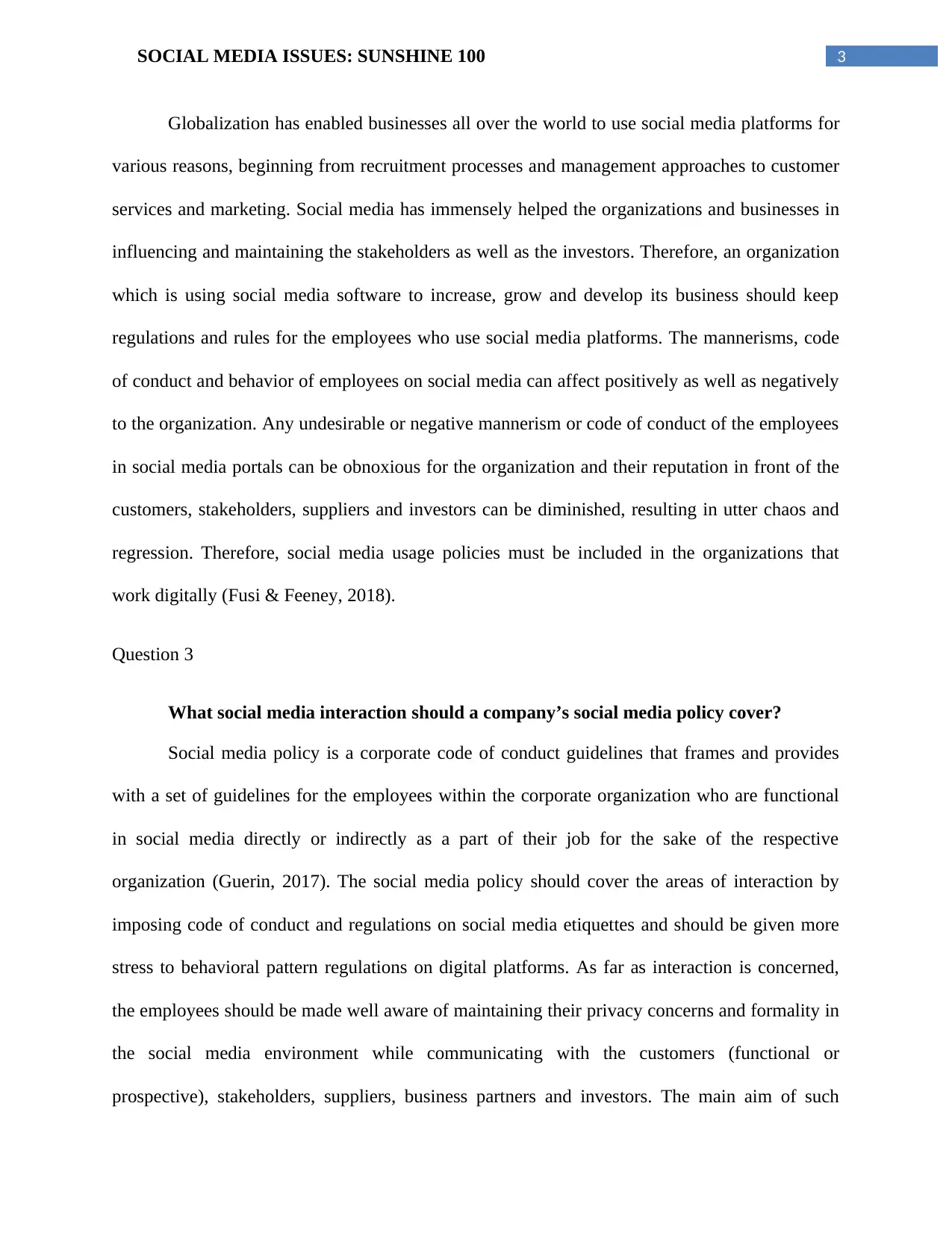
3SOCIAL MEDIA ISSUES: SUNSHINE 100
Globalization has enabled businesses all over the world to use social media platforms for
various reasons, beginning from recruitment processes and management approaches to customer
services and marketing. Social media has immensely helped the organizations and businesses in
influencing and maintaining the stakeholders as well as the investors. Therefore, an organization
which is using social media software to increase, grow and develop its business should keep
regulations and rules for the employees who use social media platforms. The mannerisms, code
of conduct and behavior of employees on social media can affect positively as well as negatively
to the organization. Any undesirable or negative mannerism or code of conduct of the employees
in social media portals can be obnoxious for the organization and their reputation in front of the
customers, stakeholders, suppliers and investors can be diminished, resulting in utter chaos and
regression. Therefore, social media usage policies must be included in the organizations that
work digitally (Fusi & Feeney, 2018).
Question 3
What social media interaction should a company’s social media policy cover?
Social media policy is a corporate code of conduct guidelines that frames and provides
with a set of guidelines for the employees within the corporate organization who are functional
in social media directly or indirectly as a part of their job for the sake of the respective
organization (Guerin, 2017). The social media policy should cover the areas of interaction by
imposing code of conduct and regulations on social media etiquettes and should be given more
stress to behavioral pattern regulations on digital platforms. As far as interaction is concerned,
the employees should be made well aware of maintaining their privacy concerns and formality in
the social media environment while communicating with the customers (functional or
prospective), stakeholders, suppliers, business partners and investors. The main aim of such
Globalization has enabled businesses all over the world to use social media platforms for
various reasons, beginning from recruitment processes and management approaches to customer
services and marketing. Social media has immensely helped the organizations and businesses in
influencing and maintaining the stakeholders as well as the investors. Therefore, an organization
which is using social media software to increase, grow and develop its business should keep
regulations and rules for the employees who use social media platforms. The mannerisms, code
of conduct and behavior of employees on social media can affect positively as well as negatively
to the organization. Any undesirable or negative mannerism or code of conduct of the employees
in social media portals can be obnoxious for the organization and their reputation in front of the
customers, stakeholders, suppliers and investors can be diminished, resulting in utter chaos and
regression. Therefore, social media usage policies must be included in the organizations that
work digitally (Fusi & Feeney, 2018).
Question 3
What social media interaction should a company’s social media policy cover?
Social media policy is a corporate code of conduct guidelines that frames and provides
with a set of guidelines for the employees within the corporate organization who are functional
in social media directly or indirectly as a part of their job for the sake of the respective
organization (Guerin, 2017). The social media policy should cover the areas of interaction by
imposing code of conduct and regulations on social media etiquettes and should be given more
stress to behavioral pattern regulations on digital platforms. As far as interaction is concerned,
the employees should be made well aware of maintaining their privacy concerns and formality in
the social media environment while communicating with the customers (functional or
prospective), stakeholders, suppliers, business partners and investors. The main aim of such
Paraphrase This Document
Need a fresh take? Get an instant paraphrase of this document with our AI Paraphraser
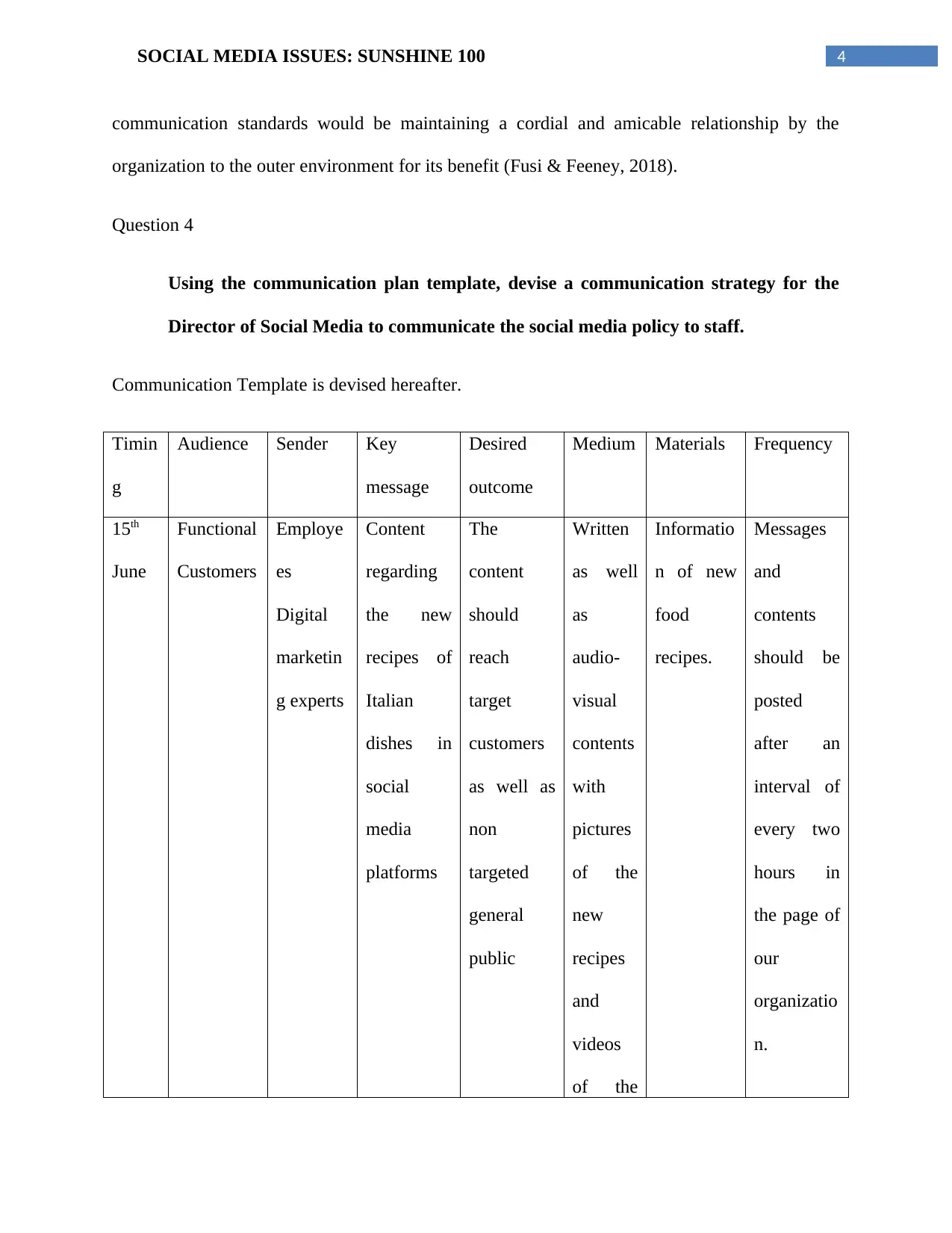
4SOCIAL MEDIA ISSUES: SUNSHINE 100
communication standards would be maintaining a cordial and amicable relationship by the
organization to the outer environment for its benefit (Fusi & Feeney, 2018).
Question 4
Using the communication plan template, devise a communication strategy for the
Director of Social Media to communicate the social media policy to staff.
Communication Template is devised hereafter.
Timin
g
Audience Sender Key
message
Desired
outcome
Medium Materials Frequency
15th
June
Functional
Customers
Employe
es
Digital
marketin
g experts
Content
regarding
the new
recipes of
Italian
dishes in
social
media
platforms
The
content
should
reach
target
customers
as well as
non
targeted
general
public
Written
as well
as
audio-
visual
contents
with
pictures
of the
new
recipes
and
videos
of the
Informatio
n of new
food
recipes.
Messages
and
contents
should be
posted
after an
interval of
every two
hours in
the page of
our
organizatio
n.
communication standards would be maintaining a cordial and amicable relationship by the
organization to the outer environment for its benefit (Fusi & Feeney, 2018).
Question 4
Using the communication plan template, devise a communication strategy for the
Director of Social Media to communicate the social media policy to staff.
Communication Template is devised hereafter.
Timin
g
Audience Sender Key
message
Desired
outcome
Medium Materials Frequency
15th
June
Functional
Customers
Employe
es
Digital
marketin
g experts
Content
regarding
the new
recipes of
Italian
dishes in
social
media
platforms
The
content
should
reach
target
customers
as well as
non
targeted
general
public
Written
as well
as
audio-
visual
contents
with
pictures
of the
new
recipes
and
videos
of the
Informatio
n of new
food
recipes.
Messages
and
contents
should be
posted
after an
interval of
every two
hours in
the page of
our
organizatio
n.
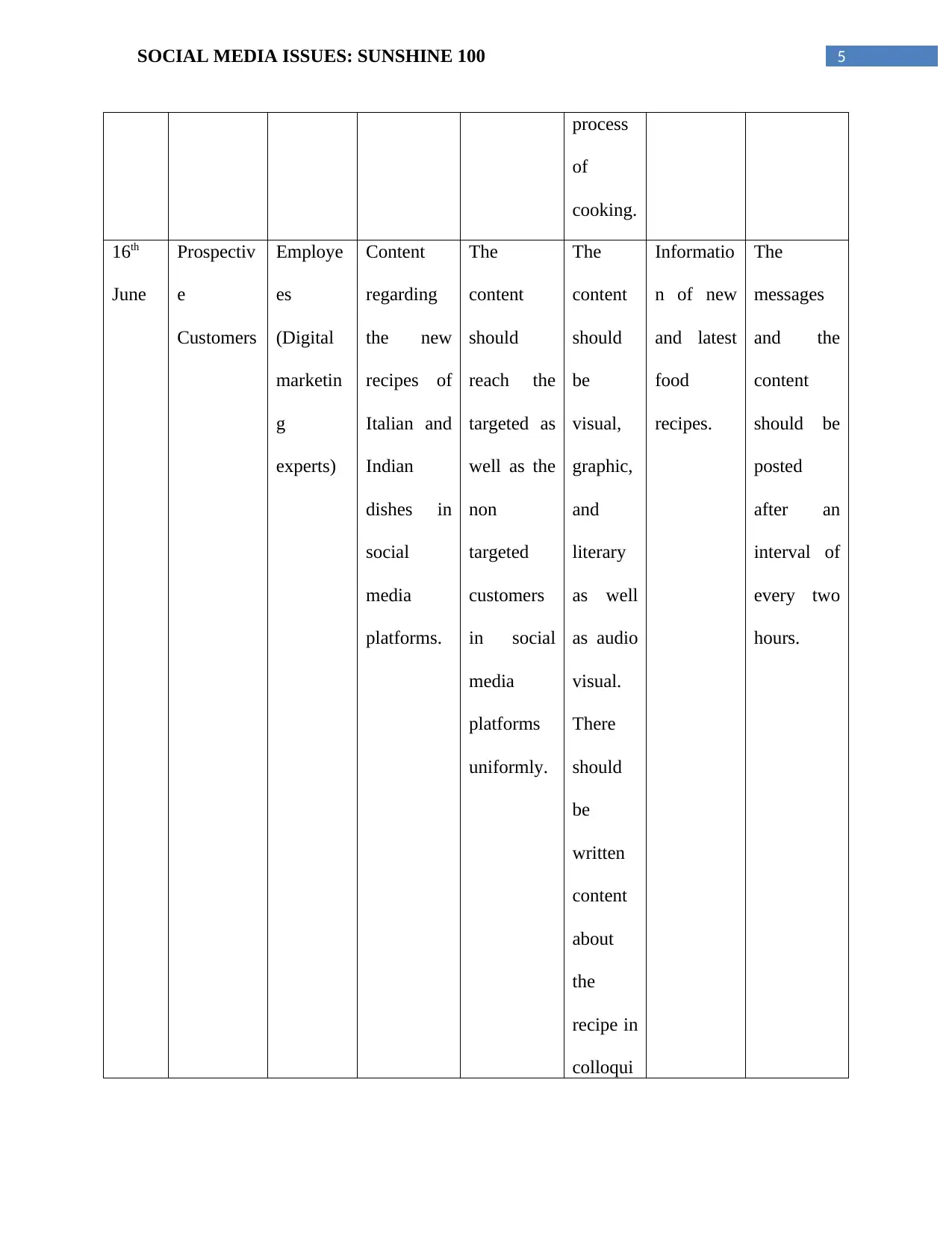
5SOCIAL MEDIA ISSUES: SUNSHINE 100
process
of
cooking.
16th
June
Prospectiv
e
Customers
Employe
es
(Digital
marketin
g
experts)
Content
regarding
the new
recipes of
Italian and
Indian
dishes in
social
media
platforms.
The
content
should
reach the
targeted as
well as the
non
targeted
customers
in social
media
platforms
uniformly.
The
content
should
be
visual,
graphic,
and
literary
as well
as audio
visual.
There
should
be
written
content
about
the
recipe in
colloqui
Informatio
n of new
and latest
food
recipes.
The
messages
and the
content
should be
posted
after an
interval of
every two
hours.
process
of
cooking.
16th
June
Prospectiv
e
Customers
Employe
es
(Digital
marketin
g
experts)
Content
regarding
the new
recipes of
Italian and
Indian
dishes in
social
media
platforms.
The
content
should
reach the
targeted as
well as the
non
targeted
customers
in social
media
platforms
uniformly.
The
content
should
be
visual,
graphic,
and
literary
as well
as audio
visual.
There
should
be
written
content
about
the
recipe in
colloqui
Informatio
n of new
and latest
food
recipes.
The
messages
and the
content
should be
posted
after an
interval of
every two
hours.
⊘ This is a preview!⊘
Do you want full access?
Subscribe today to unlock all pages.

Trusted by 1+ million students worldwide
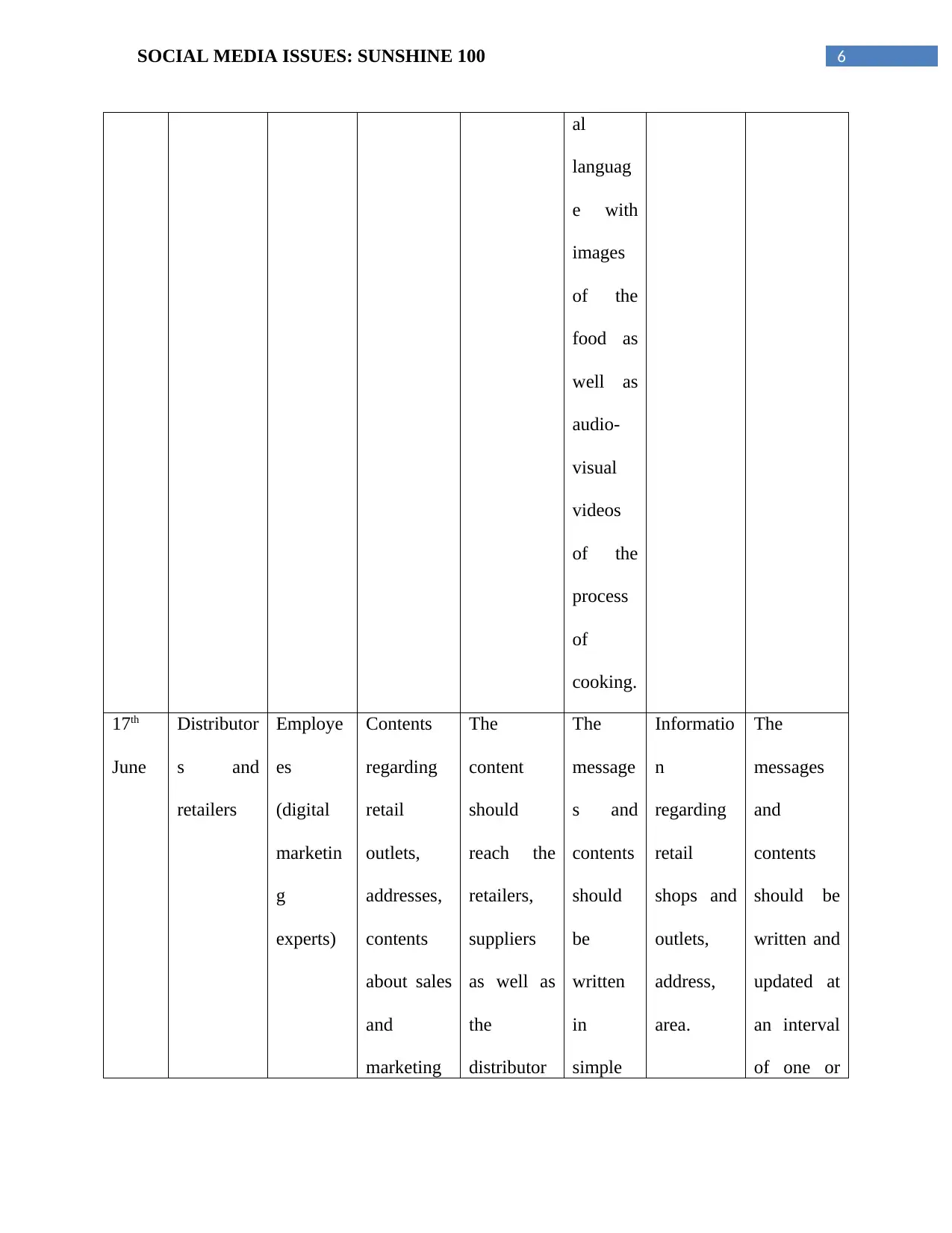
6SOCIAL MEDIA ISSUES: SUNSHINE 100
al
languag
e with
images
of the
food as
well as
audio-
visual
videos
of the
process
of
cooking.
17th
June
Distributor
s and
retailers
Employe
es
(digital
marketin
g
experts)
Contents
regarding
retail
outlets,
addresses,
contents
about sales
and
marketing
The
content
should
reach the
retailers,
suppliers
as well as
the
distributor
The
message
s and
contents
should
be
written
in
simple
Informatio
n
regarding
retail
shops and
outlets,
address,
area.
The
messages
and
contents
should be
written and
updated at
an interval
of one or
al
languag
e with
images
of the
food as
well as
audio-
visual
videos
of the
process
of
cooking.
17th
June
Distributor
s and
retailers
Employe
es
(digital
marketin
g
experts)
Contents
regarding
retail
outlets,
addresses,
contents
about sales
and
marketing
The
content
should
reach the
retailers,
suppliers
as well as
the
distributor
The
message
s and
contents
should
be
written
in
simple
Informatio
n
regarding
retail
shops and
outlets,
address,
area.
The
messages
and
contents
should be
written and
updated at
an interval
of one or
Paraphrase This Document
Need a fresh take? Get an instant paraphrase of this document with our AI Paraphraser
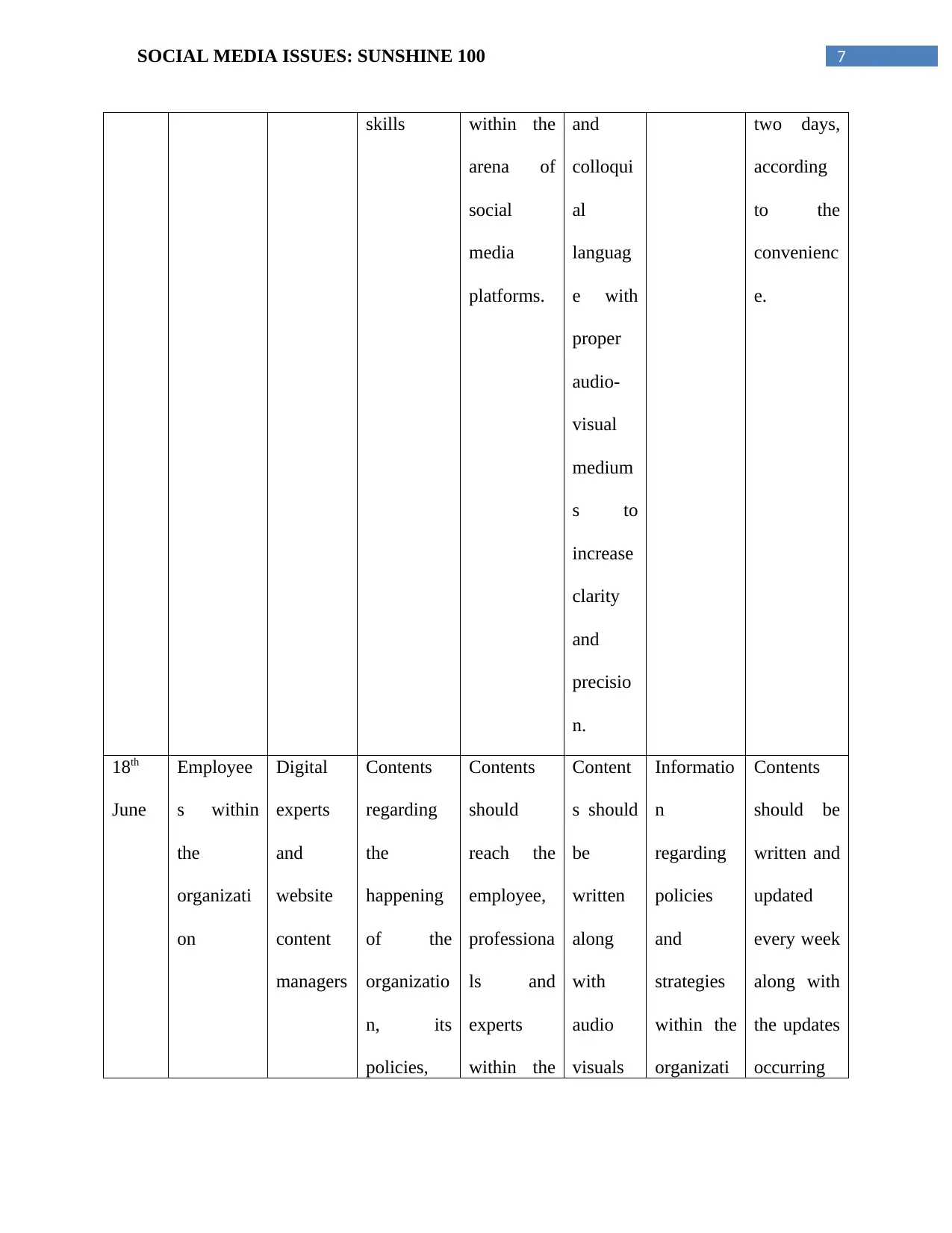
7SOCIAL MEDIA ISSUES: SUNSHINE 100
skills within the
arena of
social
media
platforms.
and
colloqui
al
languag
e with
proper
audio-
visual
medium
s to
increase
clarity
and
precisio
n.
two days,
according
to the
convenienc
e.
18th
June
Employee
s within
the
organizati
on
Digital
experts
and
website
content
managers
Contents
regarding
the
happening
of the
organizatio
n, its
policies,
Contents
should
reach the
employee,
professiona
ls and
experts
within the
Content
s should
be
written
along
with
audio
visuals
Informatio
n
regarding
policies
and
strategies
within the
organizati
Contents
should be
written and
updated
every week
along with
the updates
occurring
skills within the
arena of
social
media
platforms.
and
colloqui
al
languag
e with
proper
audio-
visual
medium
s to
increase
clarity
and
precisio
n.
two days,
according
to the
convenienc
e.
18th
June
Employee
s within
the
organizati
on
Digital
experts
and
website
content
managers
Contents
regarding
the
happening
of the
organizatio
n, its
policies,
Contents
should
reach the
employee,
professiona
ls and
experts
within the
Content
s should
be
written
along
with
audio
visuals
Informatio
n
regarding
policies
and
strategies
within the
organizati
Contents
should be
written and
updated
every week
along with
the updates
occurring
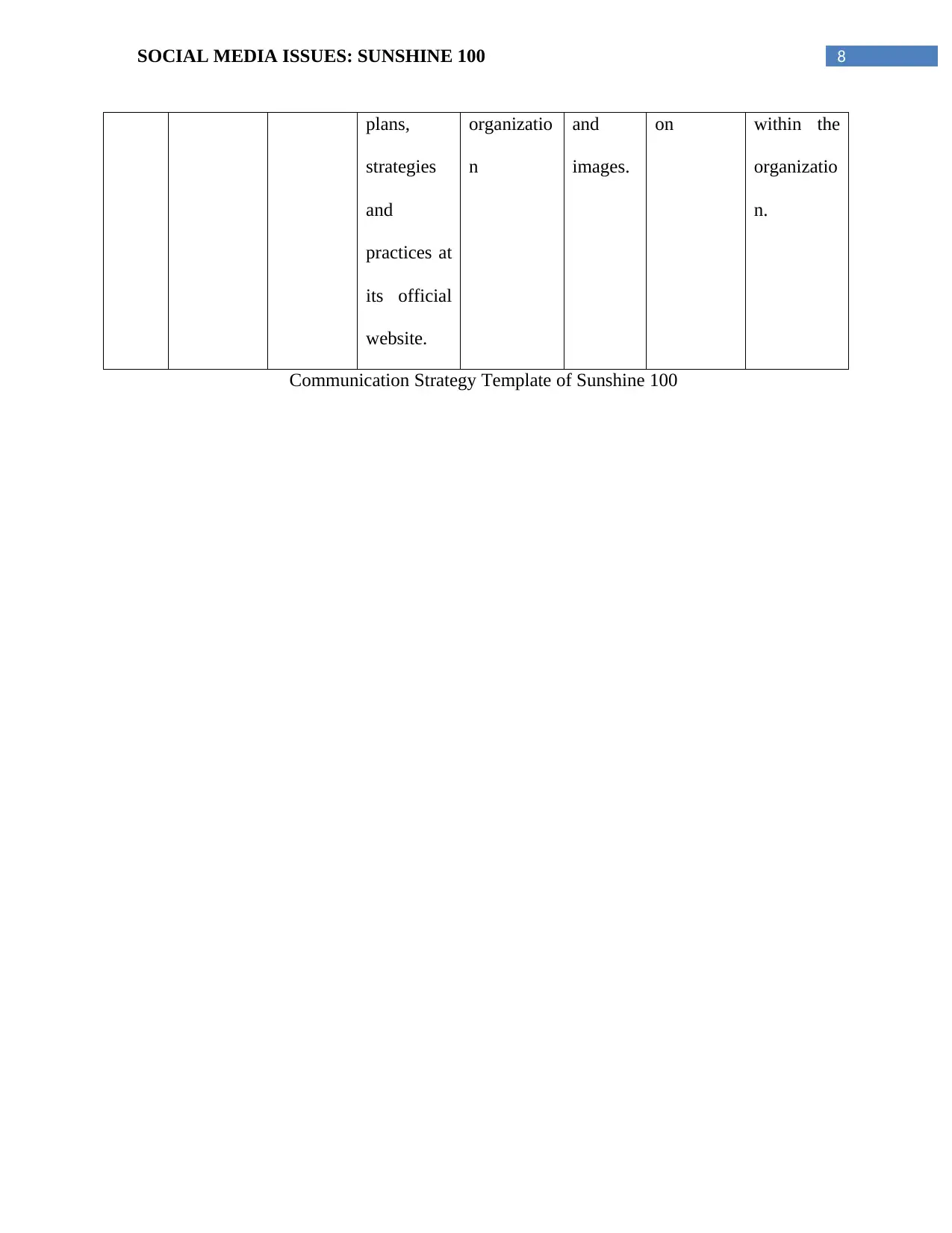
8SOCIAL MEDIA ISSUES: SUNSHINE 100
plans,
strategies
and
practices at
its official
website.
organizatio
n
and
images.
on within the
organizatio
n.
Communication Strategy Template of Sunshine 100
plans,
strategies
and
practices at
its official
website.
organizatio
n
and
images.
on within the
organizatio
n.
Communication Strategy Template of Sunshine 100
⊘ This is a preview!⊘
Do you want full access?
Subscribe today to unlock all pages.

Trusted by 1+ million students worldwide
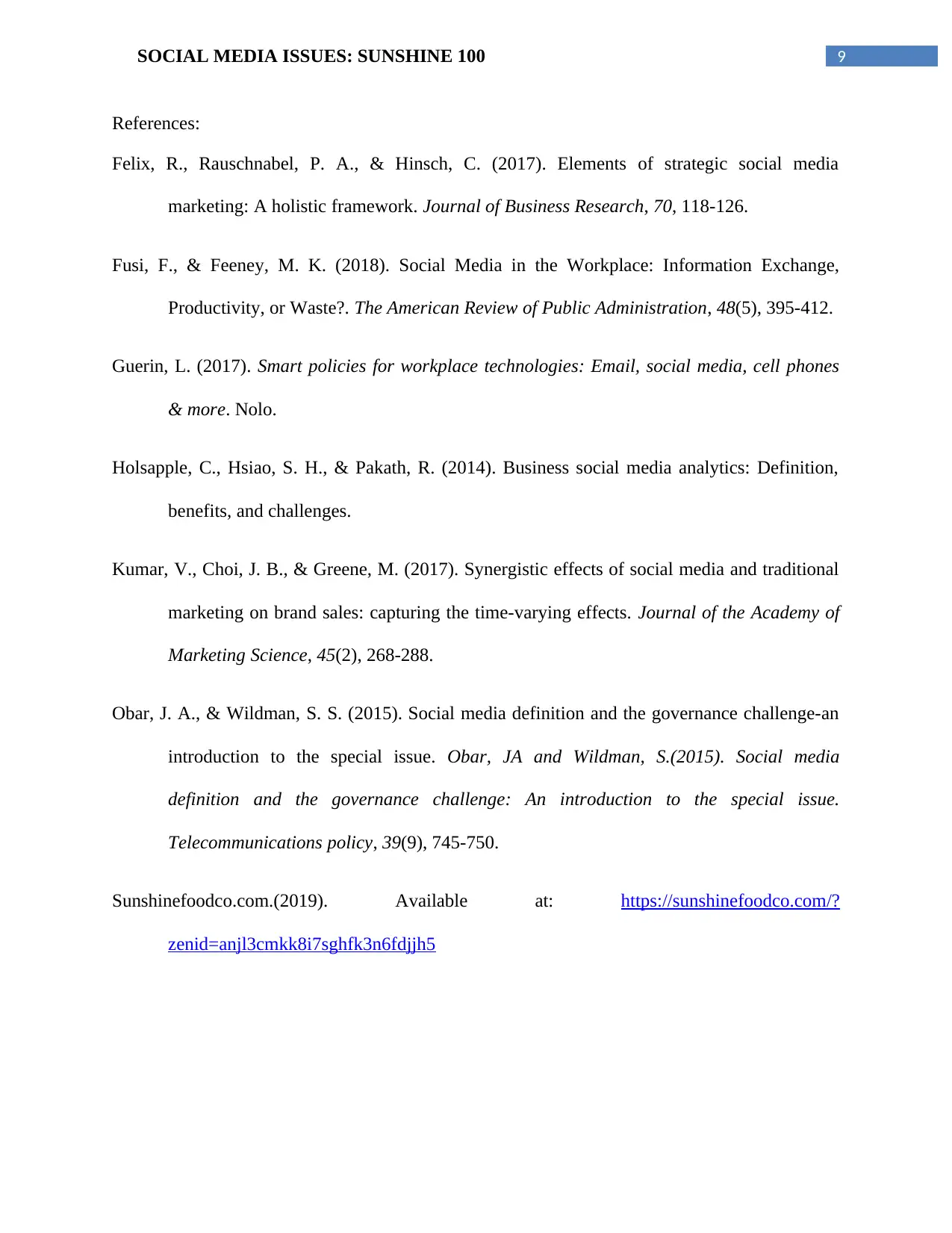
9SOCIAL MEDIA ISSUES: SUNSHINE 100
References:
Felix, R., Rauschnabel, P. A., & Hinsch, C. (2017). Elements of strategic social media
marketing: A holistic framework. Journal of Business Research, 70, 118-126.
Fusi, F., & Feeney, M. K. (2018). Social Media in the Workplace: Information Exchange,
Productivity, or Waste?. The American Review of Public Administration, 48(5), 395-412.
Guerin, L. (2017). Smart policies for workplace technologies: Email, social media, cell phones
& more. Nolo.
Holsapple, C., Hsiao, S. H., & Pakath, R. (2014). Business social media analytics: Definition,
benefits, and challenges.
Kumar, V., Choi, J. B., & Greene, M. (2017). Synergistic effects of social media and traditional
marketing on brand sales: capturing the time-varying effects. Journal of the Academy of
Marketing Science, 45(2), 268-288.
Obar, J. A., & Wildman, S. S. (2015). Social media definition and the governance challenge-an
introduction to the special issue. Obar, JA and Wildman, S.(2015). Social media
definition and the governance challenge: An introduction to the special issue.
Telecommunications policy, 39(9), 745-750.
Sunshinefoodco.com.(2019). Available at: https://sunshinefoodco.com/?
zenid=anjl3cmkk8i7sghfk3n6fdjjh5
References:
Felix, R., Rauschnabel, P. A., & Hinsch, C. (2017). Elements of strategic social media
marketing: A holistic framework. Journal of Business Research, 70, 118-126.
Fusi, F., & Feeney, M. K. (2018). Social Media in the Workplace: Information Exchange,
Productivity, or Waste?. The American Review of Public Administration, 48(5), 395-412.
Guerin, L. (2017). Smart policies for workplace technologies: Email, social media, cell phones
& more. Nolo.
Holsapple, C., Hsiao, S. H., & Pakath, R. (2014). Business social media analytics: Definition,
benefits, and challenges.
Kumar, V., Choi, J. B., & Greene, M. (2017). Synergistic effects of social media and traditional
marketing on brand sales: capturing the time-varying effects. Journal of the Academy of
Marketing Science, 45(2), 268-288.
Obar, J. A., & Wildman, S. S. (2015). Social media definition and the governance challenge-an
introduction to the special issue. Obar, JA and Wildman, S.(2015). Social media
definition and the governance challenge: An introduction to the special issue.
Telecommunications policy, 39(9), 745-750.
Sunshinefoodco.com.(2019). Available at: https://sunshinefoodco.com/?
zenid=anjl3cmkk8i7sghfk3n6fdjjh5
1 out of 10
Related Documents
Your All-in-One AI-Powered Toolkit for Academic Success.
+13062052269
info@desklib.com
Available 24*7 on WhatsApp / Email
![[object Object]](/_next/static/media/star-bottom.7253800d.svg)
Unlock your academic potential
Copyright © 2020–2026 A2Z Services. All Rights Reserved. Developed and managed by ZUCOL.





